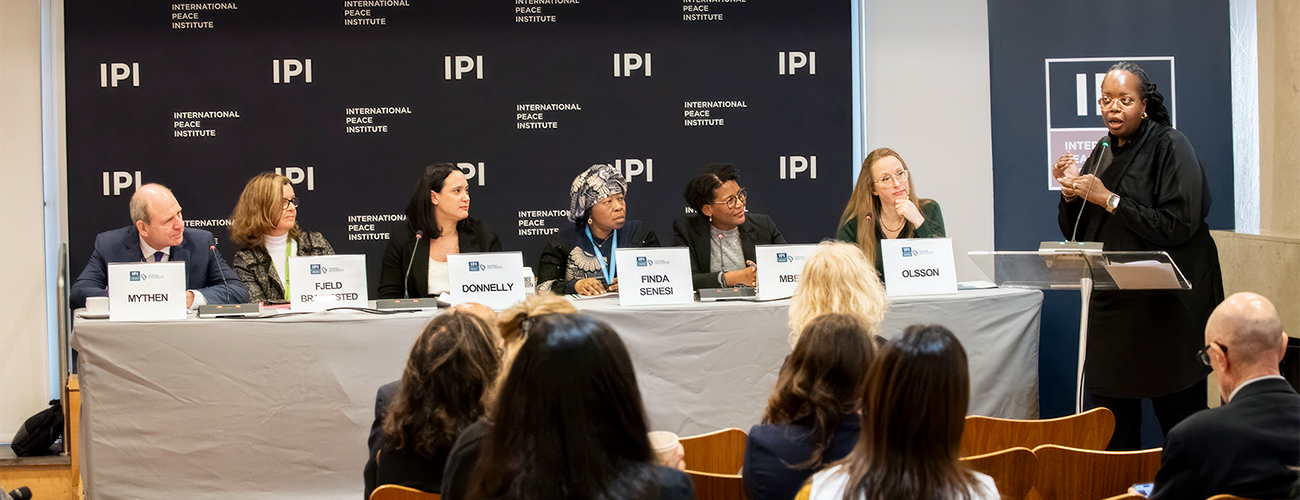In a timely discussion ahead of the 68th session of the Commission on the Status of Women on March 6th, IPI, in partnership with the Nordic Africa Institute, cohosted a hybrid policy forum. Panelists assessed the role of the Elected 10 (E10) member states in influencing UN Security Council policy outcomes and outlined strategies and challenges for these non-permanent states to advance the Women, Peace, and Security (WPS) agenda within the council. Researchers, policymakers, and former and current members of the E10 highlighted successful efforts and opportunities for growth alike to promote the WPS agenda in the face of an increasingly challenging global context. The discussion was anchored in the principles of Resolution 1325 as speakers offered their insights around the themes of centering women’s participation in peace processes, the importance of national and regional context, and the need for innovative tactics to advance the WPS agenda.
Ireland and Norway shared their best practices and lessons learned as former E10 members, emphasizing the importance of implementation beyond rhetoric. Reflecting on Norway’s recent tenure on the Security Council, Permanent Representative of Norway Merete Fjeld Brattested identified three key ways that Norway worked on Women, Peace, and Security including mainstreaming WPS language into all Security Council products, supporting and strengthening cross-regional collaboration, and prioritizing the safe and meaningful participation of women civil society briefers in formal and informal meetings.
Permanent Representative of Ireland Fergal Mythen spoke from his experience as an initiating member of the Presidency Trio of Ireland, Kenya, and Mexico: “Shoehorning women, peace, and security into one week in October is tokenizing—there needs to be more implementation, more meaningful and sustained participation of women.” He highlighted the elements of a cross-regional approach and a commitment to action as essential to the successes of the Trio, but noted the inclusion of women in peace processes as an area with much more room for improvement.
Representing the perspective of current elected member of the E10 and newly elected co-chair of the Informal Expert Group on Women, Peace, and Security, Sierra Leone, First Secretary of the Permanent Mission of the Republic of Sierra Leone Roselynn Finda Senesi offered a lucid set of objectives and actionable items. Working from the foundational idea that, “women on the frontlines don’t want good rhetoric, they need action, accountability, and change,” her objectives include: an improved collaborative link between the African Union and WPS actors in the region; processes of accountability to increase the representation of women in peace processes; clear, specific, and decisive language on WPS; and strong support and protection of women civil society briefers.
The event provided an opportunity to share the findings of the Nordic Africa Institute’s multi-year research project, “Shattering Glass: How Elected Members of the UN Security Council Fight for Women, Peace and Security,” undertaken with the Peace Research Institute Oslo. The project assessed the dynamics, politics, and processes that affect the WPS agenda in the UN Security Council, posing the question: How do the members of the E10 advance the WPS agenda within the council?
Based on this research, Louise Olsson, Research Director, Global Norms, Politics and Society, Peace Research Institute Oslo (PRIO), commented on the examples provided by other panelists and presented insights on the broader structure of the Security Council and the opportunities therein to influence WPS outcomes. One of her conclusions was that as the WPS agenda becomes further integrated into the council, the individual profile, including the position, credibility, history, and interests, of an elected member state as they come into the Security Council is an important factor in their ability to advance WPS objectives. Another factor to consider in the further incorporation of WPS is the resulting parallel rise in resource demands.
Independent Consultant and former Director of Programmes, Futurelect, Sithembile Mbete, reflected on the role of South Africa as a three-time elected member of the Security Council. Illustrating the geographic and regional significance of an E10 member articulated by many panelists, she spoke of how the nexus between domestic and foreign policy concerns, the implication of South Africa’s national interests with the interests of the African continent, and its unique history has shaped its approach to foreign policy and the advancement of WPS in its terms within the Council. One of the innovations of the E10 that Dr. Mbete highlighted was the “reform by stealth” of the Security Council.
The event concluded with a question-and-answer session open to audience members and closing remarks from Angela Muvumba Sellström, Senior Researcher of the Nordic Africa Institute and Project Lead of “E10, WPS, and the UN Security Council.”
Opening remarks:
Zeid Ra’ad Al Hussein, President and CEO, International Peace Institute
Therese Sjömander Magnusson, Director, Nordic Africa Institute (NAI)
Speakers:
H.E. Merete Fjeld Brattested, Permanent Representative of Norway to the UN
H.E. Fergal Mythen, Permanent Representative of Ireland to the UN
Roselynn Finda Senesi, First Secretary, Permanent Mission of the Republic of Sierra Leone to the UN
Louise Olsson, Research Director, Global Norms, Politics and Society, Peace Research Institute Oslo (PRIO)
Sithembile Mbete, Independent Consultant, former Director of Programmes, Futurelect
Pablo Castillo Díaz, Policy Specialist on Peace and Security, UN Women (virtual)
Moderator:
Phoebe Donnelly, Senior Fellow and Head of WPS, International Peace Institute
Closing remarks:
Angela Muvumba Sellström, Senior Researcher and Project Lead, “E10, WPS and the UN Security Council,” Nordic Africa Institute (NAI)








